A prehistoric dinosaur didn’t know it was a dinosaur.
The last two — the titans and the moguls — are two of the categories featured on a new Web site, Mediaite.com, created by NBC television legal analyst Dan Abrams. That’s media-ite, not mediate or meditate. Abrams and his crew are not divorce lawyers or zenmasters. They’re practitioners of the modern art of sizzle.
Abrams told the Washington Post, "Part of what we're doing is appreciating the celebrity of the media." The site "plays into the vanity of these individuals," added Mediaite.com Managing Editor Colby Hall. He is a former producer of the “Daily Show with Jon Stewart,” which does satirical, make-believe newscasts and pretend reports from the field on cable’s Comedy Central channel.
Not exactly the gruff, fuddy-duddy “just the facts” days before “news personalities” started elbowing each other for “face time” so they could be the story.
 |
| These are Maxim magazine’s “10 hottest news anchors.” The woman in the middle of the top row looks like she has anger issues |
I fully understand why I didn’t make the list. The only thing at which I’m a “player,” and then only occasionally, is poker. The site advises those with wounded egos who might be asking, “Why am I not on here” that “you may not be a well known person in the media.”
We don’t “move that needle,” generate “buzz,” or “push product.”
My colleagues and I who toil in pitiful anonymity don’t mind ceding the spotlight to performers, including clowns, so long as there’s still a ring for news and information.
You remember “news and information,” that musty term from the cultural crypt.
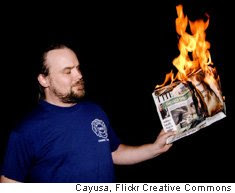 |
| Another burning question: Do we even need newspapers any more? |
That race has been run, and the results are in — on the Power Grid at Mediaite.com.
***
Read This, By Cracky!
Please forgive me. In the previous section, I used a lot of “retrotalk,” as Ralph Keyes calls it. The bestselling author, playwright (“Is There Life After High School?”), and writing critic says such practices “risk alienating those who are too young to get the allusions.”
The dears must not be confused or irritated by unfamiliar references that go back more than, say, two weeks.
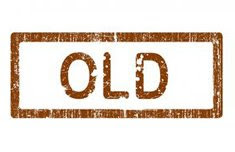 |
| Perhaps every publisher’s copy editors should have one of these stamps to imprint words that young readers might not instantly understand. The author would be instructed to find a current equivalent |
We shouldn’t, whatever we do, use common catch phrases — “98-pound weakling,” “bigger than a breadbox,” “green eyeshades,” “tough row to hoe” — Keyes warns. The young’uns might have to look them up. Oh, the hardship!
“The implicit message [that mainstream media give] to younger readers seems to be: ‘Hey, if you don’t know what we’re talking about, maybe you should butt out,’” Keyes writes.
If older journalists just can’t break themselves of arcane references from long ago (approximately May 12 and before), Ralph Keyes suggested that we add a little glossary that explains them, similar to my Wild Words but right in the text so tender young readers won’t have to strain to keep up.
Columnist Gene Weingarten of the Washington Post thinks that’s a swell idea.
Sorry, “swell” is one of those moldy oldies. It means bangin’, like da’ bomb, ya know what I mean?
Weingarten took Keyes’s admonitions to heart and wrote one of his “Below the Beltway” columns using footnotes and glossary annotations, just as Keyes suggested. Here’s an excerpt:
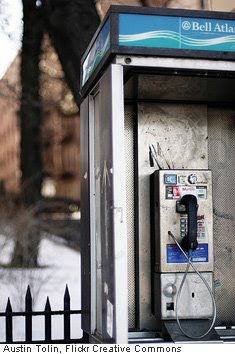 |
| Show and tell to go with Gene Weingarten’s example. This is a pay phone, also known as a “phone booth.” Coins, not credit cards or passwords, are required to operate it |
“4To put a dime in a pay phone.5”
“5A public telephone6 requiring coins to use.”
“6A phone that was available in a public place.”
Yes, siree, Bob! Footnotes within footnotes for the clueless!
Maybe we should ask those under 30 to register their email addresses. We can then boil down our stories to 140 or fewer characters and send them Tweets instead.
Here’s one: The House today passed and sent to the Senate a measure that its leaders say addresses the health-care crisis by, uh, catch you next time!
Or maybe Ralph Keyes got it right. We’re using grown-up terms here, some of which date to, like, centuries ago. If that’s too much trouble, butt out.
WARNING. The last line of this segment, to follow shortly, is for older readers and is unannotated. Information about it is not available on Facebook, MySpace, Twitter, Flock, Muck Rack, Delicious, Friend Feed, or your iPhone, unless you call a senior citizen.
23-Skidoo!
***
Fool’s Gold?
Fool’s Gold?
To add a dash of balance to all the gloom about journalism, I should report that I just attended a seminar on “social media” such as Twitter, presented by Amy Webb, a former Newsweek and Wall Street Journal reporter who founded a firm that specializes in “adapting technology for journalism.” It was she who laid out all those Web sites — Flock, Muck Rack, Delicious, et al — that I referenced a moment ago.
I had never heard of, let alone used, most of them.
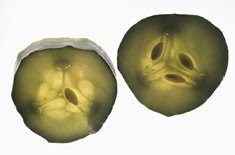 |
| Let’s say you love pickles. Adore them. You could form your own social network and connect with other pickle lovers. The cucumber crowd, too |
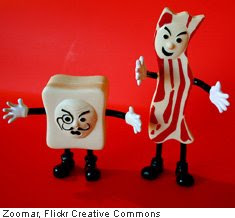 |
| This photo is entitled “Mr. Bacon versus Monsier Tofu.” Mr. Bacon would be on my list of online “friends.” Mr. Tofu would not. I might even “follow” Mr. Bacon |
Yours might be chock full of stories about kites, Fidel Castro, the Bolshevik Revolution — though a hint: not much new is happening there — fly fishing, your mom and dad and Uncle Rudy, and recipes for pizza.
It’s like an information cafeteria, serving knowledge ala carte. No tray needed. Someone will bring the news right to our “table.” And if we choose the “print-out edition,” we can still wrap fish and line the parakeet’s cage with it.
 |
| Already frazzled? Too much to do and not enough time? Wait till I show you all the new online social sites you can connect to |
Reporting and writing. My job, in other words.
And every other part of my life.
***
Parting is Semi-Sweet
Parting is Semi-Sweet
The other day, people throughout the VOA headquarters building gathered to say good-bye and good fortune to Ethel Shaw Hagans, a cheerful and indefatigable member of the Facilities staff who had kept our offices and cubicles neater than a pin for more than 20 years. Without her, the building would most certainly have been condemned, and we’d be broadcasting from fumigated Quonset huts.
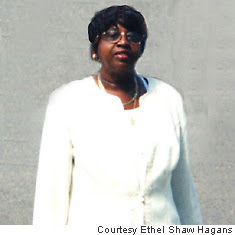 |
| Miss Ethel |
She warned Ethel — and the rest of us — to beware of an old but recently named disease called A. A. A. D. D.
A. A. A. D. D., she explained, is Age-Activated Attention Deficit Disorder, a debilitating syndrome brought on by retirement.
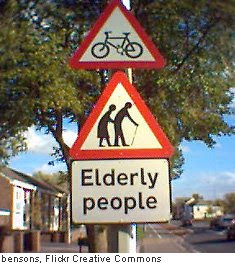 |
| Epidemiologists can strike A. A. A. D. D. gold in this neighborhood |
Here’s how Petrella described the insidious ways in which the dreaded Age-Activated Attention Deficit Disorder sneaks up on the unsuspecting retiree:
About mid-morning, you decide to make something of the day. Glancing out the window, you see that the garden needs watering. So you walk out the side door.
As you turn on the hose in the driveway, you look over at your car and see that it desperately needs washing.
You start toward the garage and notice that there is mail on the porch table that you had brought in from the mailbox earlier.
You decide to go through the mail before you wash the car.
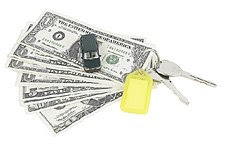 |
| Here’s a good way to keep track of your car keys |
You figure that you’d better take out the trash.
But then you decide that since you’re going to be near the mailbox when you take out the trash, you might as well pay the bills first.
You take your checkbook off the table and see that there is only one check left. Your extra checks are in your desk in the study, so you go inside the house to your desk, where you find half a can of Coke that you had been drinking.
Before you look for your checks, you decide to push the Coke away from the edge of the table so that you don't knock it over. But the Coke is getting warm, so you decide to put it in the refrigerator.
As you head toward the kitchen, flowers in a vase on the counter catch your eye. They’re limp and need to be watered.
 |
| I hope these are your reading glasses. Otherwise, how will you ever find them? |
You decide you’d better put them on your desk, where they belong, but first water the flowers.
You set the glasses back down on the counter top, prepare to fill a container with water, and suddenly spot the TV remote. Someone has left it on the kitchen table.
You know that if it stays there, you’ll be looking for it when you go to watch television tonight and won't remember that it's on the kitchen table. So you decide to take it into the TV room and put it next to your lounge chair where it belongs, but first water those flowers.
You pour water into the watering can, but quite a bit of it spills onto the floor. So you set the remote back down on the table, get some paper towels, and wipe up the spill.
Then you head out of the kitchen and down the hall, trying to remember why you’re going that way and what you were planning to do.
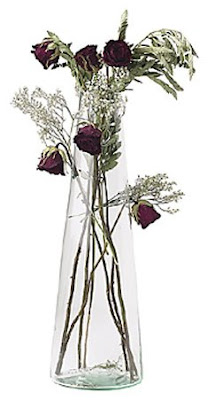 |
| See what happens when you have a full retiree’s day? |
The car isn't washed
The bills aren't paid
The wastebasket on the porch is overflowing
There is still only one check in your checkbook
There is a warm can of Coke sitting in the kitchen
The flowers have died
You can't locate the TV remote
You can't find your glasses
And you don't remember what you did with the car keys.
Then when you try to figure out why nothing got done today, you’re baffled because you know you were busy all day long, and you’re really tired.
Oh, and you left the hose running.
Note to Petrella: This is not just a retirement disease. It’s my weekend!
TODAY'S WILD WORDS
(These are a few of the words from this posting that you may not know. Each time, I'll tell you a little about them and also place them into a cumulative archive of "Ted's Wild Words" in the right-hand column of the home page. Just click on it there, and if there's another word in today's blog that you'd like me to explain, just ask!)
 |
| For sure, Charles Atlas was no 97- (or 98-) pound weakling |
Bigger than a breadbox. The meaning is clear. The term is thought to have entered popular culture thanks to American television personality Steve Allen,
 |
| Steve Allen was a hilarious TV host, willing to try offbeat skits. But he was also a gifted musician and a serious man who led an often-losing fight against indecency on the air |
Fuddy-duddy. I used this word as an adjective, but it’s usually a noun, fuddy duddy, meaning an old person, usually, who’s “stuck in his ways” and appalled by modern life.
Green eyeshades. These are clear visors, first made of celluloid and then other plastics, worn — at least in the movies — by accountants, clerks, telegraphers, and copy editors. The term became an unflattering characterization of obsessively detail-oriented people and professions.
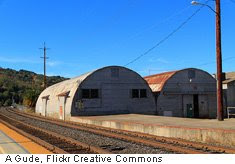 |
| These Quonset huts, used as warehouses, have seen better days. Many others of them around the world have as well |
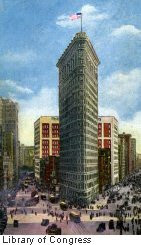 |
| You can see in this old postcard view of the Flatiron Building, shot around 1910, why a breeze might divide as it hit it and pick up papers and skirts and such |
Tough row to hoe. Often misquoted as a tough road to hoe, the expression, which ties to hard weeding in a cotton or vegetable patch, now means, more broadly, any difficult task.
Yes siree, Bob. Yes, indeed, you’d better believe it! This phrase may have first been uttered by Gabby Hayes, the cranky Western-movie sidekick to singing cowboys like Roy Rogers and Gene Autry. Hayes also let out a few “no siree, Bobs,” even to cowpokes whose names were not “Bob.”

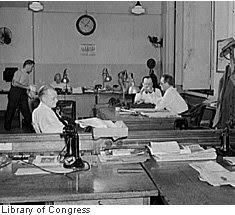







No comments:
Post a Comment